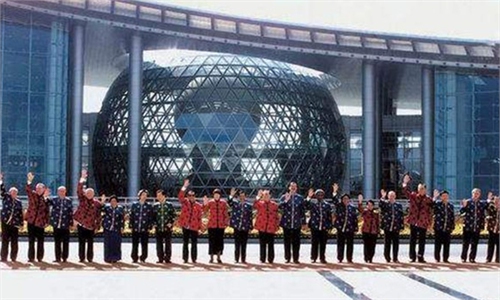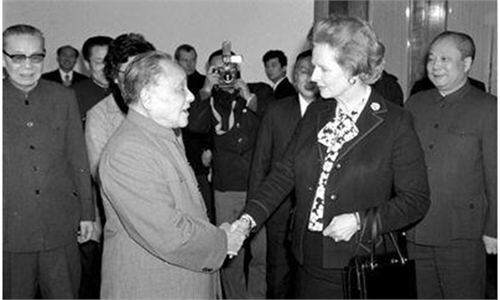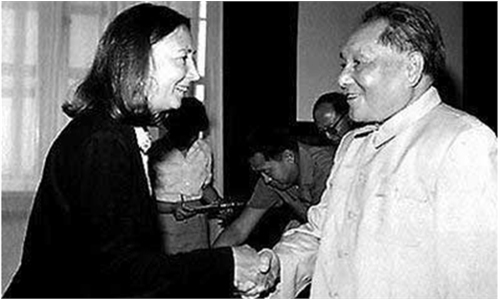The French Comrade-in-arms in China's Fight Against SARS - Alain Mérieux and the Communist Party of China
At the conference celebrating the 40th anniversary of China's reform and opening-up, 10 foreign figures received the China Reform Friendship Medal. One of the 10 recipients is an octogenarian who captured special attention. Hale and hearty with a resonant voice, he said passionately when asked about how he felt upon receiving the award, "I feel extremely proud. This is an especially important moment for me. China has witnessed a sea change over the past four decades thanks to the reform and opening-up process. It is such an honor to be part of China's development endeavor and bear witness to what it has achieved. He is Alain Mérieux, and he has long supported the Chinese people and the Communist Party of China on the path of reform and opening-up.
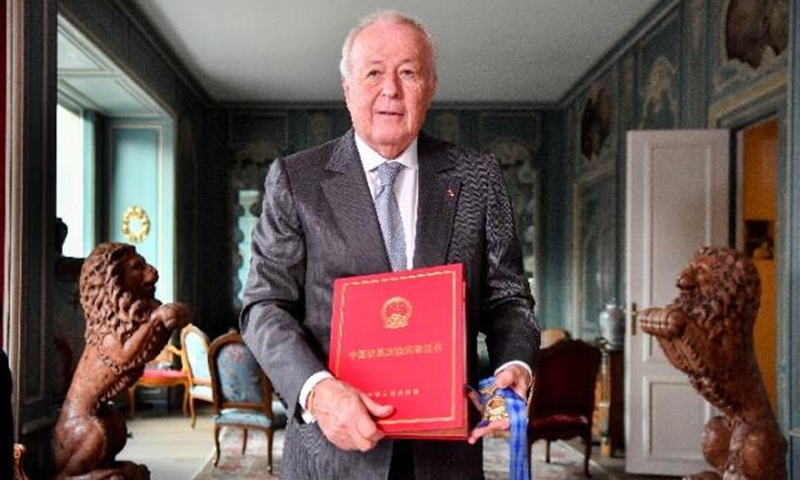
Mérieux first came to China in 1978 to promote human and veterinary vaccines. Actually, the Mérieux family have long been friends with China. Before China and France established diplomatic relations, Mérieux's father-in-law Paul Berliet had exhibited the Berliet trucks in Beijing and kicked off China-France cooperation in the automotive industry. Before the reform and opening-up, China lagged far behind the world in science. Mérieux clearly recalled that most of the audience at his lecture at the Beijing Friendship Hotel - professors, doctors and vets - were grey haired, aged 70 to 80 on average. Back then, China had to start literally from scratch in basic education and basic science and research. Despite the weak foundation, China quickly came a long way in the field of medical science and research after reform and opening-up started. Mérieux was impressed by the vast changes taking place in China. He recalled: "China rebuilt colleges and labs within a quite short period of time. That's what I admire the most about this country. It was then that my bond with China was formed." Mérieux also spoke highly of the CPC's advanced nature. He commended the Party leadership as "being extremely capable and far-sighted." China in its early stage of reform and opening-up left a deep impression on Mérieux who developed a special bond with the country.
In the 1980s, riding on the wave of reform and opening-up, BioMérieux SA officially entered the Chinese market. Like many foreign entrepreneurs, Alain Mérieux initially had some concerns about China's economic system and business environment. But soon, he found his worries were unnecessary. The Chinese government not only opened the market to foreign businesses, but also actively adapted policies to provide convenience for foreign businesses. As Mérieux said, no matter how countries vary in culture and ideology, science knows no borders; cooperation makes the future possible; and there would be no progress without openness. He was deeply encouraged by CPC leadership's open and inclusive attitude toward cooperation, which made him more determined to work with Chinese companies. Thanks to his efforts, BioMérieux and Mérieux Foundation cooperated with China in a vast array of fields such as vaccine, medical diagnosis, immunization and communicable disease control, and co-built with the Chinese side a production and R&D base in Shanghai. In 2003 when SARS hit China, BioMérieux SA took an active part in China's research on SARS control and prevention and on streptococcus, writing an admirable chapter of China-France cooperation against epidemics.
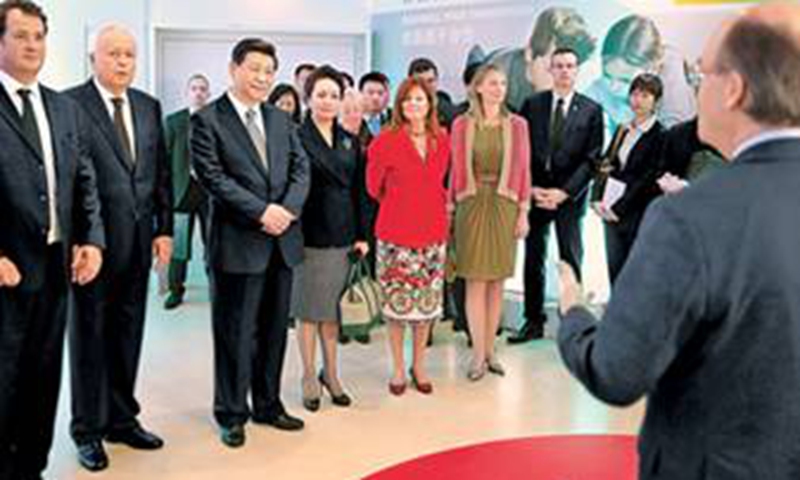
In 2013, President Xi Jinping put forward the initiative of a Silk Road Economic Belt and a 21st Century Maritime Silk Road. Mérieux spoke highly of this initiative. He believes that the Belt and Road Initiative (BRI) will lead Chinese medical teams to countries and regions plagued by diseases, especially communicable diseases, and in urgent need of assistance. This is a commitment that requires global effort. With the deepening of reform and opening-up, the BRI will deliver more solid results and reach more less-developed regions, while at the same time having to address a growing number of difficulties and challenges. As Mérieux put it, the BRI will not be an easy endeavor. But he remains fully confident in the initiative and expressed readiness to continue to deepen cooperation with China to build a global community of health for all and deliver the benefits of China-France medical cooperation to more countries.
As a witness of China's reform and opening-up, Mérieux is heartened by China's achievements. He always tells young Chinese friends that "today's China is totally different from what it was forty years ago. The miracles China has created in a generation's time surprised me. They are unprecedented in the world history." The story of friendship and cooperation between China and the Mérieux family will continue. China will open even wider and continue to write new chapters in its cooperation with the rest of the world.

Alain Mérieux is awarded the China Reform Friendship Medal.
Mérieux first came to China in 1978 to promote human and veterinary vaccines. Actually, the Mérieux family have long been friends with China. Before China and France established diplomatic relations, Mérieux's father-in-law Paul Berliet had exhibited the Berliet trucks in Beijing and kicked off China-France cooperation in the automotive industry. Before the reform and opening-up, China lagged far behind the world in science. Mérieux clearly recalled that most of the audience at his lecture at the Beijing Friendship Hotel - professors, doctors and vets - were grey haired, aged 70 to 80 on average. Back then, China had to start literally from scratch in basic education and basic science and research. Despite the weak foundation, China quickly came a long way in the field of medical science and research after reform and opening-up started. Mérieux was impressed by the vast changes taking place in China. He recalled: "China rebuilt colleges and labs within a quite short period of time. That's what I admire the most about this country. It was then that my bond with China was formed." Mérieux also spoke highly of the CPC's advanced nature. He commended the Party leadership as "being extremely capable and far-sighted." China in its early stage of reform and opening-up left a deep impression on Mérieux who developed a special bond with the country.
In the 1980s, riding on the wave of reform and opening-up, BioMérieux SA officially entered the Chinese market. Like many foreign entrepreneurs, Alain Mérieux initially had some concerns about China's economic system and business environment. But soon, he found his worries were unnecessary. The Chinese government not only opened the market to foreign businesses, but also actively adapted policies to provide convenience for foreign businesses. As Mérieux said, no matter how countries vary in culture and ideology, science knows no borders; cooperation makes the future possible; and there would be no progress without openness. He was deeply encouraged by CPC leadership's open and inclusive attitude toward cooperation, which made him more determined to work with Chinese companies. Thanks to his efforts, BioMérieux and Mérieux Foundation cooperated with China in a vast array of fields such as vaccine, medical diagnosis, immunization and communicable disease control, and co-built with the Chinese side a production and R&D base in Shanghai. In 2003 when SARS hit China, BioMérieux SA took an active part in China's research on SARS control and prevention and on streptococcus, writing an admirable chapter of China-France cooperation against epidemics.

President Xi Jinping visiting the BioMérieux Research Center in Lyon, France.
In 2013, President Xi Jinping put forward the initiative of a Silk Road Economic Belt and a 21st Century Maritime Silk Road. Mérieux spoke highly of this initiative. He believes that the Belt and Road Initiative (BRI) will lead Chinese medical teams to countries and regions plagued by diseases, especially communicable diseases, and in urgent need of assistance. This is a commitment that requires global effort. With the deepening of reform and opening-up, the BRI will deliver more solid results and reach more less-developed regions, while at the same time having to address a growing number of difficulties and challenges. As Mérieux put it, the BRI will not be an easy endeavor. But he remains fully confident in the initiative and expressed readiness to continue to deepen cooperation with China to build a global community of health for all and deliver the benefits of China-France medical cooperation to more countries.
As a witness of China's reform and opening-up, Mérieux is heartened by China's achievements. He always tells young Chinese friends that "today's China is totally different from what it was forty years ago. The miracles China has created in a generation's time surprised me. They are unprecedented in the world history." The story of friendship and cooperation between China and the Mérieux family will continue. China will open even wider and continue to write new chapters in its cooperation with the rest of the world.
